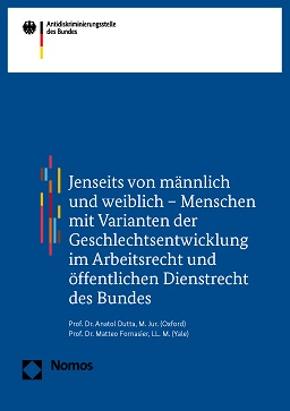Beyond
male and female
People with variations in sex characteristics in labour law and federal public employment law
- Factsheet to the study -
Authors: Prof. Dr. Anatol Dutta, M. Jur. (Oxford), Munich, Prof. Dr. Matteo Fornasier, LL. M. (Yale), Ruhr-University Bochum, Year of publication: 2019
Brief overview
In 2013 and 2018, German civil status law was amended to create the option for people with variations in sex characteristics to not specify their gender or to specify it as “diverse” instead of “male” or “female” in civil status entries. The present study aims to examine the impact of this legislative decision on labour and public employment law. An individual’s gender – especially on the part of employees – is of crucial importance in both areas of law. Both areas of law, however, continue to largely follow a binary gender model, which only distinguishes between male and female. The study seeks to explore which gender-specific norms are applicable to persons with an unspecified or diverse gender entry under the recognised methods of applying the law and which norms require clarification or legal policy decisions by legislators. Not only does the study look at German constitutional law, which was a driving force behind the legal recognition of intersex people, but it also focuses on European Union law. European Union law plays a key role in protecting people against gender-specific discrimination at work. By contrast, the study does not explore the general question of terminological changes to the relevant provisions; this question goes beyond labour and public employment law and already arises in the binary gender system.
Main results
The decision of the Federal Constitutional Court, stating that people with variations in sex characteristics must be allowed a positive gender entry as long as the gender is registered for purposes of civil status law, and the legislative implementation of this requirement in the revised Civil Status Act have far-reaching consequences on the legal system as a whole.
Options for action
All labour law and federal public employment law provisions in which gender is a constituent element require adjustment.
The required legislative adjustments vary depending on which type of gender-related norms is affected:
- For protection from discrimination and maternity leave provisions, no legislative adjustments appear warranted under constitutional law. The requirements under constitutional law for protecting employees who choose to leave their gender entry blank or to specify it as “diverse” can already be satisfied through interpretation and the judicial development of the law. Such an adjustment is compatible with European anti-discrimination law requirements. The revised Maternity Leave Act includes a special provision protecting intersex employees.
- Legislative intervention appears to be indispensable in neutral legal differentiations, i.e. provisions which differentiate by gender without improving the typically disadvantaged gender. Instead of such provisions, special rules should be introduced for the third gender option (extended differentiation model) or the gender-specific differentiation should be dispensed with in general (unisex model). Conversely, people with the gender entry “diverse” or without a positive gender entry suffer from an infringement to their fundamental rights if legislation only gives them the right to choose whether they want to be subject to regulations for men or for women (binary option model).
- The situation proves more complicated with regard to positive discrimination measures in favour of the under-represented gender. For historical and systematic reasons, the gender equality principle laid down in Article 3 para. 2 of the German Constitution, which legitimises such differentiations, only covers the relation between women and men. A preferential treatment of intersex people through quotas or other support systems cannot be justified without an amendment of the German Constitution. However, under-represented women and men must not be treated preferentially at the expense of intersex people. An appropriate clarification in the regulations on gender equality appears desirable. For that matter, completely removing gender-specific support models is constitutionally justifiable (unisex model). A right for people with variations in sex characteristics to choose whether they wish to be assigned the male or female gender for the purposes of support regulations (option model) is not compatible with the German Constitution, however.
Insofar as labour law or public employment law provides for special regulations for the protection of people with variations in sex characteristics, legislation is permitted to limit this protection to persons who have made use of the third gender option in accordance with civil status law.

